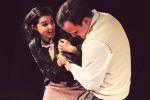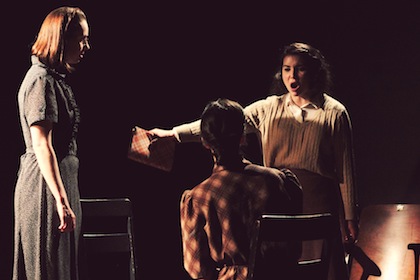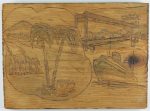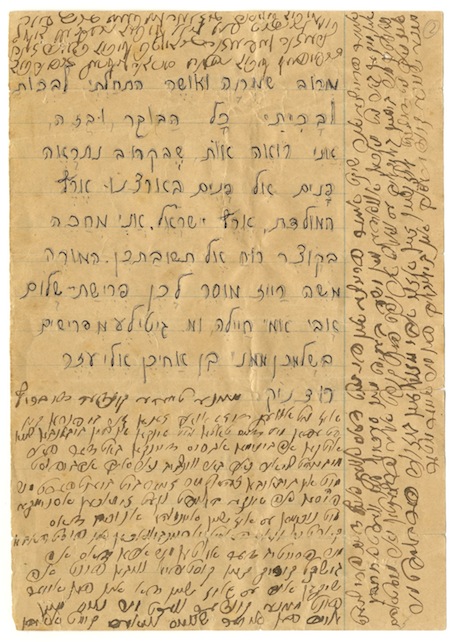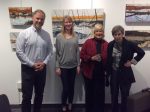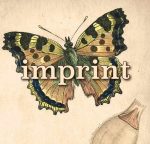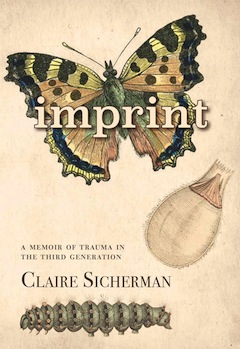An historical photo of Line 41 blending into a drawing of the buildings and street. (photo by Marek Iwicki, drawing Tanja Cummings)
The Line 41 streetcar ran through Lodz Ghetto (Litzmannstadt). Established by the Nazis in 1939, 180,000 Jews and 5,000 Sinti and Roma were imprisoned there, in plain site of the streetcar passengers. As these travelers went about their daily routines for the next several years, 46,000 people died from hunger, disease and violence in the ghetto and practically everyone else was deported to Auschwitz or Chelmno extermination camps. By August 1944, fewer than 900 prisoners remained; the Soviet army arrived in January 1945.
The documentary film Line 41 focuses on the story of two men: Natan Grossmann, who survived the ghetto, and Jens-Jurgen Ventzki, whose father was the Nazi mayor of the city. It will see its Canadian première on July 11, 7:45 p.m., at Vancity Theatre. The screening will be followed by a discussion between Berlin-based director Tanja Cummings and Prof. Richard Menkis, associate professor of modern Jewish history at the University of British Columbia.
“I was interested in participating,” Menkis told the Independent, “because I am a Holocaust educator, quite simply. As such, I think it is important to engage the different ways of approaching the Holocaust…. I teach the course on the Holocaust at UBC, have published on aspects of the Holocaust and have worked on museum exhibitions. I am also interested in film representations – especially in documentaries – so I am glad to be involved. The film raises several important issues, especially about ‘bystanders,’ and I look forward to having a conversation about the film and its themes.”
Released in 2016, Line 41 has screened in Germany, Poland, Austria, Romania, the United States and Australia. The film took about nine years to make, with the initial idea for it coming in 2007.
“Everything started by reading the 1937 novel by Israel Joshua Singer, Di brider Aschkenasi [The Brothers Ashkenazi],” Cummings told the Independent. “It was this great novel that raised my interest in Lodz in the very first place and it made me travel there in 2008 or so.”
Cummings was initially interested in Lodz before the Second World War. “The history of Lodz was very much influenced by German, Polish and Jewish populations since the early 19th century,” she explained. “In a positive way, one could say that these groups worked together to transform a small village into a major European centre of textile production within a few decades.”
Known variously as “the Manchester of Poland” and the “Eldorado of the East,” she said, “Immigrants from all over Europe came to this ‘Promised Land.’ This term was actually coined for this city by [Nobel Prize-winning author] Wladyslaw Reymont in a novel of that title…. Later on, the famous Polish filmmaker Andrzej Wajda made a feature film out of it, with, again, the same title (or, in Polish, Ziemia Obiecana).
“So, it was Germans, Jews, Poles and also Russians who dominated the development of Lodz. Knit together – through trade, business, politics and bureaucracy – every group played its specific role, and made up what was and still is called ‘the Lodz man,’ ‘Lodzermensch,’ a ‘man’ of special wit of life and street smarts, so this fascinated me.”
Over time, her focus shifted.
“I tried to meet witnesses of German, Polish and Jewish background who, through their family background, would be able to tell me about these prewar times,” she said, “but, ‘naturally,’ all their stories circled around the era in which this world of the Lodzermensch was destroyed – by the invasion of the German Wehrmacht, the Second World War and the times of the ghetto. This is what their stories focused on, as they themselves had experienced it as young adults, teenagers, children. Through meeting these witnesses and hearing their powerful, shattering stories, it became clear that one must record them and their stories so that they would reach a larger audience. And, early on, it was clear to me that we should try to find witnesses – last witnesses – of these various groups: roughly, the victims, the perpetrators, the bystanders.”
Cummings said, “When you walk through Lodz today or through the area of the former ghetto for that matter, which formed a large part of this city, you realize that many of the buildings, streets, backyards, hallways and flats do not seem to have changed since the time of the war…. In many streets, time seems to stand still. The buildings still stand in their roughness, but the people of the ghetto of 1940 until 1944 (or early 1945) are gone. Yet, people live there today and seem to be oblivious to what happened in their streets, flats, courtyards.
“This is especially painful if one can connect certain buildings with specific stories of people and families – through the narratives told to us; through historical literature and through diaries or other reports, for example, Berlin Jewish families whose deportation has been traced, the places where they ‘lived’ in the ghetto and what happened to them, which tragedies evolved, which terror was inflicted upon them there, or in the camps, such as Kulmhof [Chelmno] or Auschwitz.
“A key moment that shocked me deeply was when, in 2010 or 2011, a Lodz German in his early 80s – not the one whom we see in the film – walked us through streets of the former ghetto area and he showed to us the street where the streetcar line ran through, coming from the ‘free’ part of the city. This was the first time I had ever heard about this streetcar,” said Cummings. “And he told us he had been a passenger in this streetcar many times, and that the ghetto was plainly visible to him and anybody who took this streetcar – not once, many times. And, while he told us this, streetcars passed by. In Lodz, the past is very present,” as it is elsewhere, in places like Berlin, and all over Europe.
“Since that day with this elderly Lodz German (who, after the war, did not leave this city) I tried to find more witnesses from this period of the war who would tell their stories from their own perspectives: Jewish survivors of the ghetto, but also Germans and Poles who lived around the ghetto which was hermetically closed and isolated over the course of four years. Germans and Poles, what did they see, what did they know? What was told in families, at school? What was the atmosphere in the city back then?
“The ghetto was a different matter altogether, and the narratives very much circled around survival, hunger and nightmarish scenes, but also culture, resistance – so many efforts to stay human.
“As for the main protagonist, Natan Grossmann, who was a teenager during ghetto times, we also tried to find out – together with him – about the fate of his older brother. To Natan, since the day his brother vanished in March 1942 in the ghetto, he had no clue what had happened to him.”
In the main phases of filming, from 2011 to 2013, about 120 hours with witnesses was recorded, after which it was decided the documentary would focus on Grossmann and Ventzki.
“When we started, we had no clear vision of what [the witnesses] would tell us, or where we would go with them, where they would lead us – all these things developed in the process of filming – or what we, together with the protagonists, would find out, what we would learn from them,” said Cummings.
When Grossmann arrived in the British Mandate of Palestine in 1946, she explained, “he felt he was ‘reborn’ there and crossed out the past from his mind. He suppressed what had happened to him in Lodz Ghetto, in Auschwitz, other camps in Germany, the death march…. He crossed this out from his daily life and did not talk about it. He did not look for his brother Ber, whose fate was unknown to him, except one attempt, when he visited Auschwitz in the 1980s but could not find any records there on his brother.”
Only because Grossmann was persuaded “to travel with us to Lodz in 2011, visit archives and connect with historians there, did we, together, finally find out what happened to his older brother Ber.”
In the film, Grossmann searches “not only for his brother, but also for the graves of his parents, who were murdered in the ghetto, and for photographs of anybody from his once-large family, as he has none of his close family.”
Ventzki, the second main protagonist, is the son of Werner Ventzki, a Nazi official and German mayor of Lodz (then Litzmannstadt) during the German occupation. “So, the son goes on a journey as well,” said Cummings, “but from a completely different perspective – as son of a perpetrator fighting a silence, the silence in his family, and trying to find ways of dealing with the fact that his father was a Nazi perpetrator, and his mother, too.”
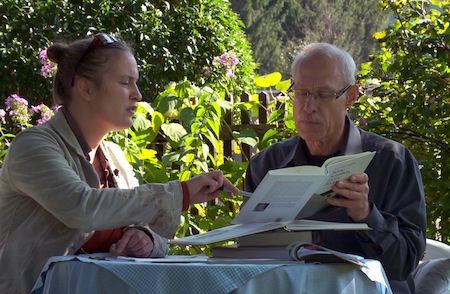
During filming, Ventzki and Grossmann were kept apart. “We traveled with them separately,” she said, “as we felt then it may be too intense and heavy for both of them. Only much later, [while the film was] in the editing room already, in 2013, we decided we should try to have them meet (and start filming again).”
The meeting took place at Ventzki’s home in Austria. “In the film, you can see their first-ever meeting, moments of this meeting, which, in the film, form the most powerful and, for some, unbearable moments in the film, towards its end. In fact, these moments were the starting point of a … deep friendship between these two men.”
The film isn’t intended to be “a ‘didactic play’ or tell audiences what to think,” said Cummings, “but rather to ask questions, as the film does…. I would be glad if this kind of curiosity and openness is transmitted to the audiences.”
While the film deals with historical issues, it does so, for the most part, through “the two main protagonists, who used to stand on different ‘sides of the fence’: victims and perpetrators. But the film is not about reconciliation, but rather about meeting and listening to each other. If audiences feel how important that is, or feel the power of what happens there or may happen there, that would be wonderful. And this reaches out beyond the ‘topic’ of the Shoah or Holocaust – there is something universal about it.”
For more information, visit linie41-film.net. For tickets to the screening and discussion, which is being presented by the Vancouver Foreign Film Society, go to viff.org. Vancity classifies the film as suitable for ages 19+.


